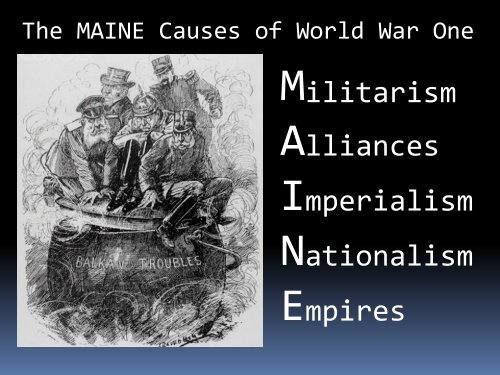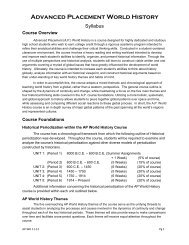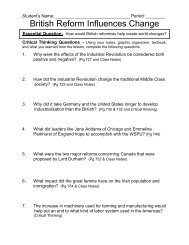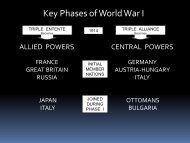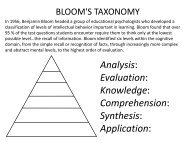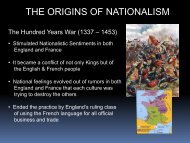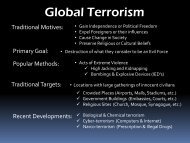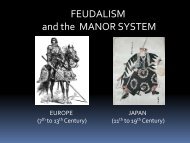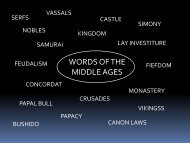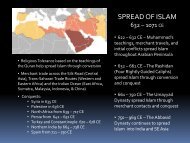87 - Causes of WWI
87 - Causes of WWI
87 - Causes of WWI
Create successful ePaper yourself
Turn your PDF publications into a flip-book with our unique Google optimized e-Paper software.
The MAINE <strong>Causes</strong> <strong>of</strong> World War One<br />
M<br />
A<br />
I<br />
N<br />
E<br />
ilitarism<br />
lliances<br />
mperialism<br />
ationalism<br />
mpires
Nationalism<br />
“Development <strong>of</strong> a Collective State based on<br />
shared ethnic, cultural, and historical identity”<br />
• Second French Republic (1848-1854)<br />
• Unification <strong>of</strong> Italy (1848-1<strong>87</strong>0)<br />
• Unification <strong>of</strong> Germany (1848-1<strong>87</strong>1)<br />
• Pan-Slavism versus Pan-Germanism (1848-1914)<br />
• Balkan Crisis (1<strong>87</strong>8-1914)
Nationalism & Empires<br />
Franco-Austrian War (1859)<br />
• France & Italy versus<br />
Austria-Hungary<br />
• French efforts to prove it is<br />
still a European Military Power<br />
• Conflict helped to Unify the<br />
Italian States against Austria<br />
The Crimean War (1853-1856)<br />
• Russia versus Ottomans, British,<br />
French, and Italy<br />
• Increased European Influences<br />
on declining Ottoman Empire<br />
• “First Modern War” due to tactical<br />
use <strong>of</strong> Railways, Telegraph, and<br />
establishment <strong>of</strong> the Nursing Corps
Nationalism & Empires<br />
Franco-Prussian War (1<strong>87</strong>0-71)<br />
• France versus Prussia &<br />
Austria-Hungary<br />
• Orchestrated by Otto Von Bismark<br />
“I knew that a Franco-Prussian War<br />
must take place to Unify Germany”<br />
• Final Unification <strong>of</strong> Germany (1<strong>87</strong>1)<br />
Austro-Prussian War (1866)<br />
• Prussia versus Austria-Hungary<br />
• Orchestrated by Otto Von Bismark<br />
to help unite German States<br />
• Increased German Nationalism in<br />
the region
Nationalism & Empires<br />
Russo-Turkish War (1<strong>87</strong>7-1<strong>87</strong>8)<br />
• Russia & the Balkan States versus Ottoman Empire<br />
• Russian desires to recover lost territories from the Crimean War<br />
• Increased Balkan Nationalism in Bosnia, Serbia, Romania,<br />
Bulgaria, and Montenegro due to decline <strong>of</strong> the Ottoman Empire<br />
• Pan-Slavic ties were<br />
increased between<br />
Russia and the newly<br />
Independent Balkan<br />
States<br />
• Tension increased<br />
between Russia and<br />
Austria-Hungary over<br />
control <strong>of</strong> the Balkan<br />
Region
Nationalism & Empires<br />
Russo-Japanese War (1904-1905)<br />
• Russia had ambitions for expansion into East Asia<br />
• Japan desired to be recognized as an imperial global power<br />
• Russia’s Trans-Siberian railway brought them closer to needed<br />
resources in China<br />
• Japanese interests in Korea<br />
and Manchuria caused the<br />
First Sino-Japanese War<br />
(1894-1895)<br />
• Russian treaty with China<br />
and involvement in the<br />
Triple Intervention in 1902<br />
caused conflict with Japan<br />
• Russian defeat lost them<br />
international esteem and<br />
gained Japan recognition
Empires & Imperialism<br />
“The Political and Economic control <strong>of</strong> another state’s<br />
territories by Military or Political means”<br />
Russian Empire (1830 – 1914)<br />
• Russo-Polish War (1830-1831)<br />
• Crimean War (1853-1856)<br />
• Russo-Turkish War (1<strong>87</strong>7-1<strong>87</strong>8)<br />
• Russo-Japanese War (1904-1905)<br />
French Empire (1830 – 1914)<br />
• Invasion <strong>of</strong> Algeria in 1830<br />
• Intervention in Mexico (1861-67)<br />
• Protectorate <strong>of</strong> Tunisia (1881)<br />
• Establishment <strong>of</strong> French Indo-<br />
China (1884-85)
Empires & Imperialism<br />
“The Political and Economic control <strong>of</strong> another state’s<br />
territories by Military or Political means”<br />
Berlin Conference (1884-1885)<br />
• Influenced by Social Darwinism<br />
and ideas <strong>of</strong> European Superiority<br />
• New Resources needed for Industry<br />
• France and Great Britain biggest<br />
winners; Germany & Italy<br />
dissatisfied with results<br />
British Empire (1830 – 1914)<br />
• British Raj (Imperial control<br />
<strong>of</strong> India, Burma and Singapore)<br />
• Zulu and Boer Wars gain<br />
control <strong>of</strong> South Africa<br />
• “The sun never sets on the<br />
British<br />
Empire”
Alliances<br />
“Agreements between two or more countries to advance common<br />
goals and to secure common interests”<br />
• League <strong>of</strong> Three Emperors (22 Oct 1<strong>87</strong>3)<br />
• Dual Alliance (7 Oct 1<strong>87</strong>9)<br />
• Triple Alliance (20 May 1882)<br />
• Franco-Russian Alliance (4 Jan 1894)<br />
• Triple Intervention (23 Apr 1895)<br />
• Anglo-Japanese Alliance (30 Jan 1902)<br />
• Entente Cordiale (8 Apr 1904)<br />
• Anglo-Russian Entente (31 Aug 1907)<br />
• Triple Entente (1907)
Alliances<br />
“Agreements between two or more countries to advance common<br />
goals and to secure common interests”<br />
DUAL ALLIANCE<br />
Germany & Austria-Hungary<br />
joined forces to protect<br />
themselves from Russia<br />
The Dual Alliance (7 Oct 1<strong>87</strong>9)<br />
• Designed by Otto Von Bismark<br />
The Triple Alliance (20 May 1882)<br />
• Designed by Otto Von Bismark<br />
• Due to increasing tension between France<br />
& Italy over territories in North Africa<br />
• Due to concerns over aggressive foreign<br />
policies <strong>of</strong> Russia & Great Britain<br />
• Germany & Austria-Hungary pledge support<br />
to protect each other from possible<br />
Russian aggression over the Balkans<br />
TRIPLE ALLIANCE<br />
Germany & Austria-Hungary<br />
made pact with Italy to<br />
prevent Russia alliance
Alliances<br />
“Agreements between two or more countries to advance common<br />
goals and to secure common interests”<br />
FRANCO-RUSSIAN<br />
ALLIANCE<br />
France and Russia<br />
joined forces to protect<br />
themselves from Germany<br />
Franco-Russian Alliance (4 Jan 1894)<br />
• Directly designed to counter Triple Alliance<br />
• Mutual protection against possible German<br />
aggression (East or West)<br />
• Mutual military aid and joint training<br />
The Triple Intervention (23 Apr 1895)<br />
• Protect Russian Interests in China<br />
• German attempts to acquire Pacific<br />
territories<br />
• Distract Russia from German efforts in<br />
Europe<br />
• France obligated due to Russian alliance<br />
TRIPLE<br />
INTERVENTION<br />
French, British & Russian<br />
efforts to end problems <strong>of</strong><br />
the Sino-Japanese War
Alliances<br />
“Agreements between two or more countries to advance common<br />
goals and to secure common interests”<br />
ANGLO-JAPANESE<br />
ALLIANCE<br />
British and Japanese<br />
efforts to protect colonial<br />
claims in the Pacific<br />
The Entente Cordiale (8 Apr 1904)<br />
• Great Britain and France<br />
• Concerns <strong>of</strong> German Military Expansion<br />
• Great Britain still trying to maintain<br />
their “Splendid Isolation,” while<br />
maintaining a Balance <strong>of</strong> Power in Europe<br />
Anglo-Japanese Alliance (30 Jan 1902)<br />
• British opposition to Russian expansion<br />
in Asia and the Triple Intervention<br />
• British support <strong>of</strong> Japanese Modernization<br />
• Ease U.S. concerns over Japanese expansion<br />
ENTENTE CORDIALE<br />
An agreement between<br />
France & Britain to try and<br />
maintain balance <strong>of</strong> power
Alliances<br />
“Agreements between two or more countries to advance common<br />
goals and to secure common interests”<br />
ANGLO-RUSSIAN<br />
ENTENTE<br />
Attempts to reduce rivalry<br />
between Britain & Russia in<br />
Central Asian territories<br />
The Triple Entente (By 1908)<br />
• Response to growing German Naval threat<br />
to British Naval Supremacy<br />
• Ended British “Splendid Isolation”<br />
policy <strong>of</strong> neutrality in European affairs<br />
• Closed the gap between the Franco-<br />
Russian & Anglo-Russian Alliances<br />
Anglo-Russian Entente (31 Aug 1907)<br />
• Concerns over Germany & Triple Alliance<br />
• Division <strong>of</strong> Persia between Russia (North)<br />
and Britain (South West)<br />
• British to retain protectorate status over<br />
Afghanistan<br />
TRIPLE ENTENTE<br />
Britain, France and Russia<br />
create an alliance to oppose<br />
Germany’s Triple Alliance
FRANCO-RUSSIAN<br />
ALLIANCE<br />
France and Russia<br />
joined forces to protect<br />
themselves from Germany<br />
TRIPLE ALLIANCE<br />
Germany & Austria-Hungary<br />
made pact with Italy to<br />
prevent Russia alliance<br />
DUAL ALLIANCE<br />
Germany & Austria-Hungary<br />
joined forces to protect<br />
themselves from Russia<br />
TRIPLE<br />
INTERVENTION<br />
French, British & Russian<br />
efforts to end problems <strong>of</strong><br />
the Sino-Japanese War<br />
TRIPLE ENTENTE<br />
Britain, France and Russia<br />
create alliance to oppose<br />
Germany’s Triple Alliance<br />
ANGLO-JAPANESE<br />
ALLIANCE<br />
British and Japanese<br />
efforts to protect colonial<br />
claims in the Pacific<br />
ENTENTE CORDIALE<br />
An agreement between<br />
France & Britain to try and<br />
maintain balance <strong>of</strong> power<br />
ANGLO-RUSSIAN<br />
ENTENTE<br />
Attempts to reduce rivalry<br />
between Britain & Russia in<br />
Central Asian territories
Alliances<br />
“Agreements between two or more countries to advance common<br />
goals and to secure common interests”
• Use <strong>of</strong> Military<br />
Conscriptions<br />
France since 1790’s<br />
Austria-Hungary 1868<br />
Prussia-Germany 1<strong>87</strong>0<br />
Italy 1<strong>87</strong>3<br />
Russia 1<strong>87</strong>4<br />
Militarism<br />
• Military Forces became independent<br />
entities within each government that<br />
had little to no civilian control<br />
• Military Expenditures Increased Rapidly<br />
Combined Cost Increases for Germany, Italy,<br />
UK, France, Russia, and Austria-Hungary<br />
(Million’s <strong>of</strong> $$$)<br />
1<strong>87</strong>0 1880 1890 1900 1910 1914<br />
94 130 154 268 289 398<br />
France = 10% Increase<br />
Britain = 13% Increase<br />
Russia = 39% Increase<br />
Germany = 73% Increase
Militarism<br />
• The Military Arms Race<br />
Machine Guns (1884)<br />
U-Boats (1886)<br />
Dreadnoughts (1905)<br />
Zeppelin (1908)<br />
Airplanes (1911)<br />
Armored Tank (1911)<br />
Poison Gas (1914)<br />
Railway Guns (1916)
Militarism<br />
Development <strong>of</strong> the Machine Gun<br />
• Maxim Machine Gun (1884)<br />
• Chauchat Light MG (1908)<br />
• Hotchkiss Light MG (1909)<br />
• Vickers Machine Gun (1912)
German Submarine Forces in <strong>WWI</strong><br />
1914 = 24 1915 = 29<br />
1916 = 54 1917 = 133<br />
1918 = 142 Total Built = 351<br />
Militarism<br />
Development <strong>of</strong> the Submarine<br />
• Nordenfelt Submarine (1886)<br />
• German U-Boat (1905)<br />
• British R-Class (1917)
Militarism<br />
Development <strong>of</strong> the Dreadnought<br />
“Big-Gun Heavy-Armament<br />
Battleships”<br />
• Satsuma (Imperial Japan)<br />
• HMS Dreadnought (Royal Navy)<br />
• USS Michigan (US Navy)<br />
All developed in 1905
Militarism<br />
Development <strong>of</strong> Aerial Combat<br />
• Zeppelin (Developed in 1908)<br />
• Fokker Airplane (1912)<br />
• Sopwith Pup (1915)<br />
• Sopwith Camel (1917)
Militarism<br />
Development <strong>of</strong> the Tank<br />
• British Mark I (Royal Army)<br />
• German A7V (Daimler-Benz)<br />
• French FT17 (Renault)<br />
All Developed by 1916
Gas Mask was invented by an African-American<br />
Inventor named Garrett A. Morgan in 1912, but<br />
was not developed for the war until 1916 in UK<br />
Militarism<br />
Development <strong>of</strong> Poison Gas<br />
• Bromide Gas by France (1914)<br />
• Chlorine Gas by Germany (1915)<br />
• Phosgene Gas by France (1916)<br />
• Mustard Gas by Germany (1917)
Militarism<br />
Development <strong>of</strong> the Railway Gun<br />
Early uses <strong>of</strong> Railway Artillery<br />
• American Civil War (1862)<br />
• Franco-Prussian War (1<strong>87</strong>0)<br />
• Second Boer War (1900)<br />
Lack <strong>of</strong> large numbers <strong>of</strong> Heavy Artillery<br />
Caused countries to re-develop idea in <strong>WWI</strong>
The MAINE <strong>Causes</strong> <strong>of</strong> World War One
The Immediate <strong>Causes</strong> <strong>of</strong> <strong>WWI</strong><br />
Due to Alliance<br />
France pledges<br />
Support to Russia<br />
FRANCE<br />
Great Britain<br />
declared War<br />
on Germany<br />
GREAT<br />
BRITAIN<br />
Joined the<br />
Allied Side<br />
in 1917<br />
UNITED STATES<br />
2 Aug 1914<br />
3 Aug 1914<br />
4 Aug 1914<br />
12 Aug 1914<br />
JAPAN 1916 CHINA 1917<br />
Germany declares<br />
War on France and<br />
Initiates Schlieffin Plan<br />
GERMANY<br />
Due to Triple Alliance<br />
Germany declared<br />
War on Russia<br />
AUSTRIA-<br />
HUNGARY<br />
Austrian<br />
Arch-Duke<br />
Killed<br />
By Serb<br />
War is<br />
Declared<br />
By<br />
Austria<br />
BOSNIA-SERBIA<br />
1 Aug 1914<br />
5 Aug 1914<br />
Entered War in 1916<br />
as Central Power<br />
29 Jul 1914<br />
ITALY<br />
Switched<br />
Sides in 1916<br />
O<br />
E<br />
T<br />
M<br />
T<br />
P<br />
O<br />
I<br />
M<br />
R<br />
A<br />
E<br />
N<br />
Russian Troops<br />
Struggle to<br />
Defend along<br />
Eastern Front<br />
RUSSIA<br />
Russian Army<br />
Mobilizes to<br />
Support Serbia


